BHM109: Research and Communication Skills in Hospitality Management
VerifiedAdded on 2023/06/03
|7
|1429
|201
Essay
AI Summary
This essay explores the critical role of interpersonal communication skills in the hospitality industry, specifically focusing on how these skills impact the success of managers and employees. The essay begins by defining interpersonal communication and highlighting its importance in expressing thoughts, feelings, and information, particularly in a service-oriented environment. It then delves into the discussion, drawing on research to demonstrate how effective communication enables hospitality managers to navigate diverse workforces, build positive relationships with guests and employees, and deliver superior service. The essay also emphasizes the importance of training in interpersonal communication, highlighting how these skills contribute to guest satisfaction and employee confidence. Furthermore, it examines the negative consequences of poor communication skills, such as reduced employee confidence and difficulties in processing information. The essay concludes by summarizing the key findings and reiterating that strong communication skills are essential for leadership and organizational success in the hospitality sector. The essay references multiple sources to support its claims, and includes a comprehensive reference list.
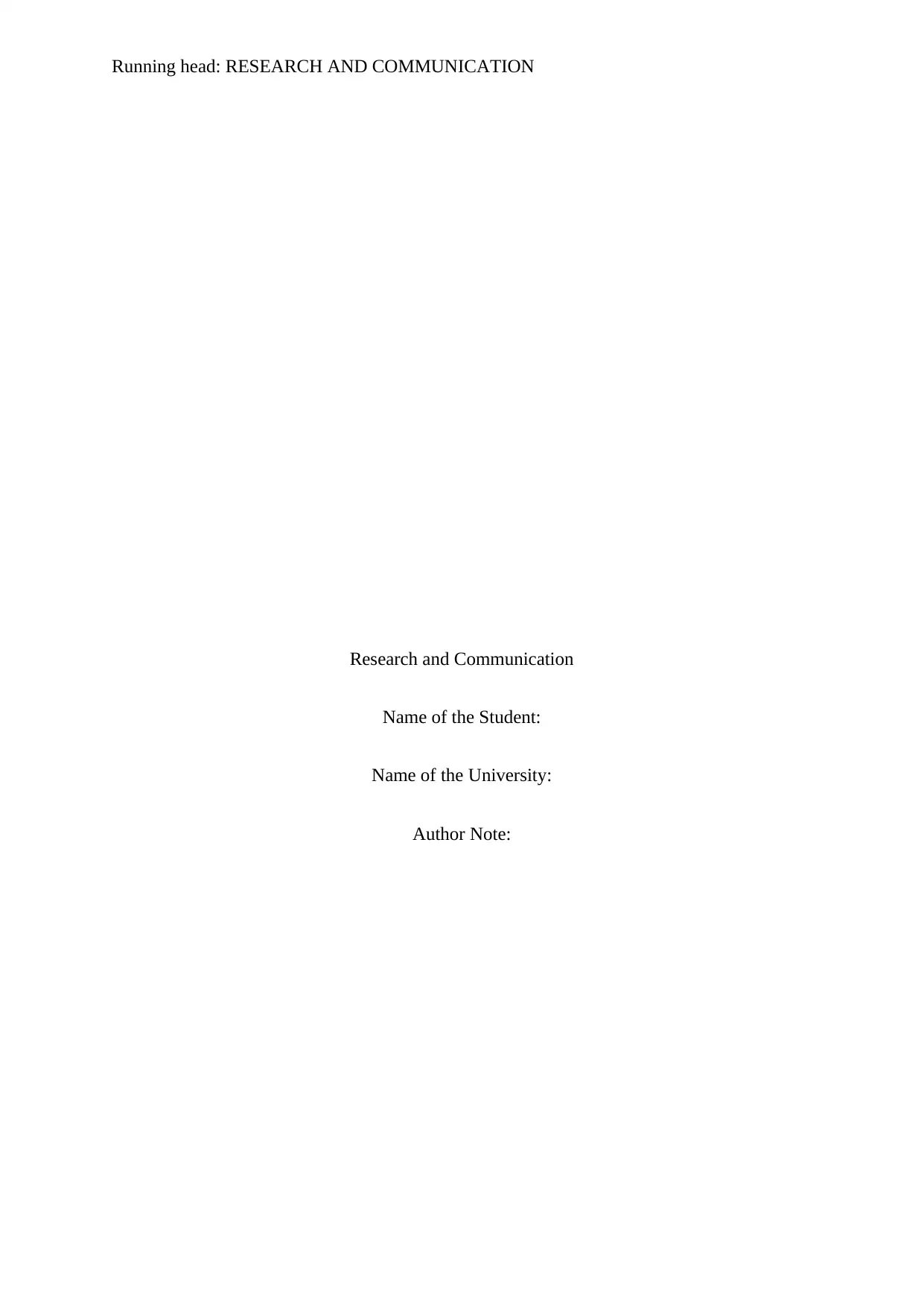
Running head: RESEARCH AND COMMUNICATION
Research and Communication
Name of the Student:
Name of the University:
Author Note:
Research and Communication
Name of the Student:
Name of the University:
Author Note:
Paraphrase This Document
Need a fresh take? Get an instant paraphrase of this document with our AI Paraphraser
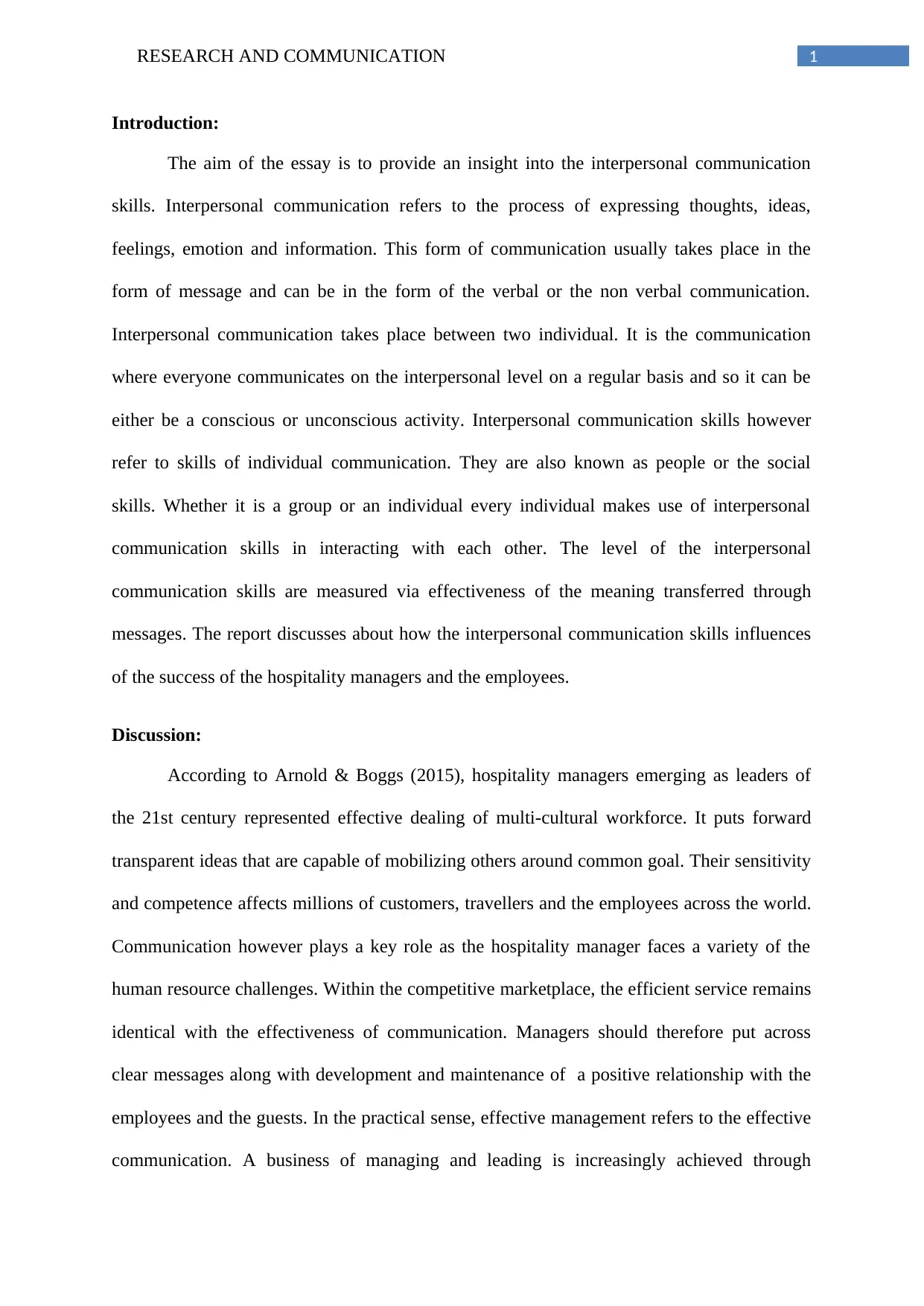
1RESEARCH AND COMMUNICATION
Introduction:
The aim of the essay is to provide an insight into the interpersonal communication
skills. Interpersonal communication refers to the process of expressing thoughts, ideas,
feelings, emotion and information. This form of communication usually takes place in the
form of message and can be in the form of the verbal or the non verbal communication.
Interpersonal communication takes place between two individual. It is the communication
where everyone communicates on the interpersonal level on a regular basis and so it can be
either be a conscious or unconscious activity. Interpersonal communication skills however
refer to skills of individual communication. They are also known as people or the social
skills. Whether it is a group or an individual every individual makes use of interpersonal
communication skills in interacting with each other. The level of the interpersonal
communication skills are measured via effectiveness of the meaning transferred through
messages. The report discusses about how the interpersonal communication skills influences
of the success of the hospitality managers and the employees.
Discussion:
According to Arnold & Boggs (2015), hospitality managers emerging as leaders of
the 21st century represented effective dealing of multi-cultural workforce. It puts forward
transparent ideas that are capable of mobilizing others around common goal. Their sensitivity
and competence affects millions of customers, travellers and the employees across the world.
Communication however plays a key role as the hospitality manager faces a variety of the
human resource challenges. Within the competitive marketplace, the efficient service remains
identical with the effectiveness of communication. Managers should therefore put across
clear messages along with development and maintenance of a positive relationship with the
employees and the guests. In the practical sense, effective management refers to the effective
communication. A business of managing and leading is increasingly achieved through
Introduction:
The aim of the essay is to provide an insight into the interpersonal communication
skills. Interpersonal communication refers to the process of expressing thoughts, ideas,
feelings, emotion and information. This form of communication usually takes place in the
form of message and can be in the form of the verbal or the non verbal communication.
Interpersonal communication takes place between two individual. It is the communication
where everyone communicates on the interpersonal level on a regular basis and so it can be
either be a conscious or unconscious activity. Interpersonal communication skills however
refer to skills of individual communication. They are also known as people or the social
skills. Whether it is a group or an individual every individual makes use of interpersonal
communication skills in interacting with each other. The level of the interpersonal
communication skills are measured via effectiveness of the meaning transferred through
messages. The report discusses about how the interpersonal communication skills influences
of the success of the hospitality managers and the employees.
Discussion:
According to Arnold & Boggs (2015), hospitality managers emerging as leaders of
the 21st century represented effective dealing of multi-cultural workforce. It puts forward
transparent ideas that are capable of mobilizing others around common goal. Their sensitivity
and competence affects millions of customers, travellers and the employees across the world.
Communication however plays a key role as the hospitality manager faces a variety of the
human resource challenges. Within the competitive marketplace, the efficient service remains
identical with the effectiveness of communication. Managers should therefore put across
clear messages along with development and maintenance of a positive relationship with the
employees and the guests. In the practical sense, effective management refers to the effective
communication. A business of managing and leading is increasingly achieved through
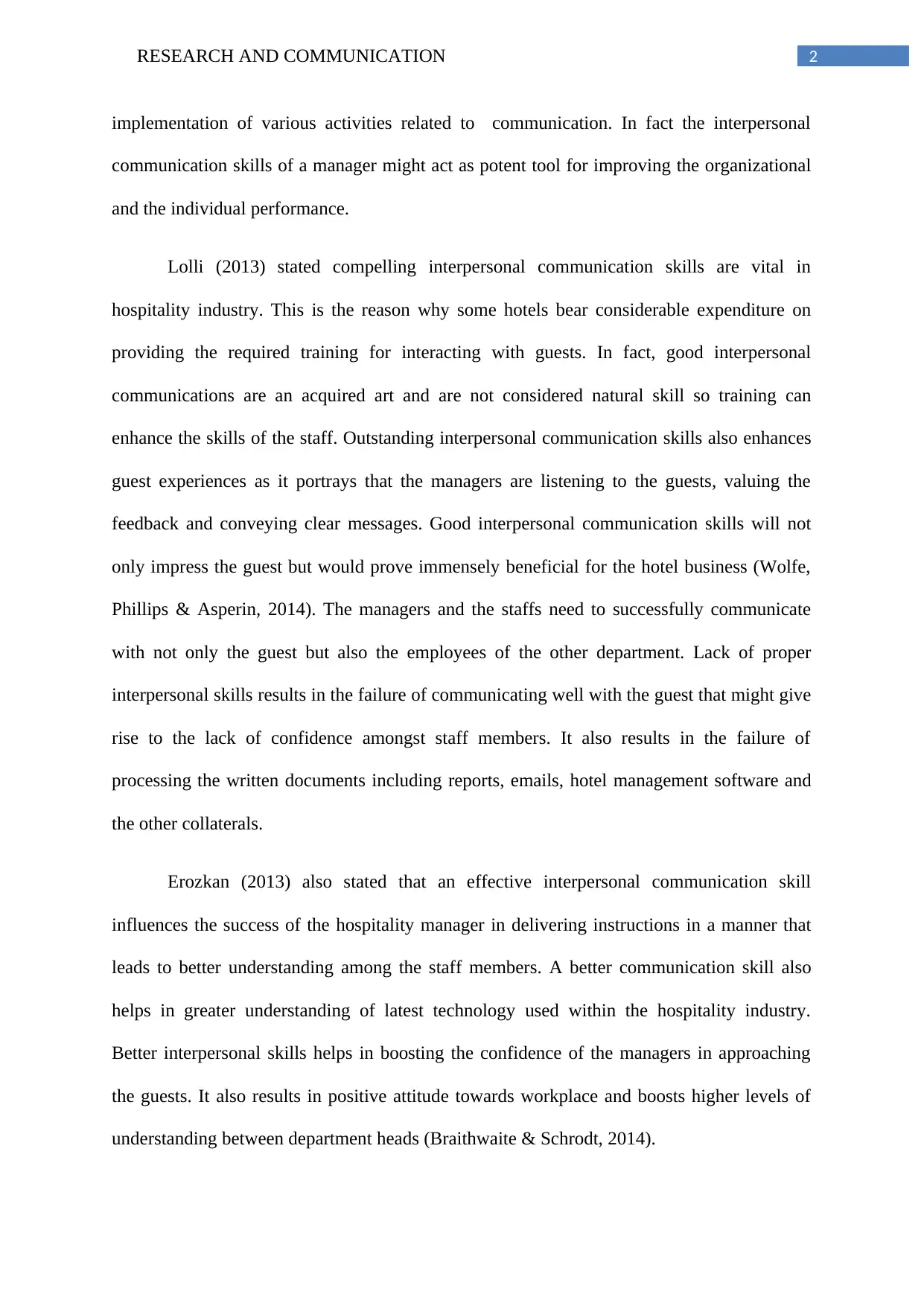
2RESEARCH AND COMMUNICATION
implementation of various activities related to communication. In fact the interpersonal
communication skills of a manager might act as potent tool for improving the organizational
and the individual performance.
Lolli (2013) stated compelling interpersonal communication skills are vital in
hospitality industry. This is the reason why some hotels bear considerable expenditure on
providing the required training for interacting with guests. In fact, good interpersonal
communications are an acquired art and are not considered natural skill so training can
enhance the skills of the staff. Outstanding interpersonal communication skills also enhances
guest experiences as it portrays that the managers are listening to the guests, valuing the
feedback and conveying clear messages. Good interpersonal communication skills will not
only impress the guest but would prove immensely beneficial for the hotel business (Wolfe,
Phillips & Asperin, 2014). The managers and the staffs need to successfully communicate
with not only the guest but also the employees of the other department. Lack of proper
interpersonal skills results in the failure of communicating well with the guest that might give
rise to the lack of confidence amongst staff members. It also results in the failure of
processing the written documents including reports, emails, hotel management software and
the other collaterals.
Erozkan (2013) also stated that an effective interpersonal communication skill
influences the success of the hospitality manager in delivering instructions in a manner that
leads to better understanding among the staff members. A better communication skill also
helps in greater understanding of latest technology used within the hospitality industry.
Better interpersonal skills helps in boosting the confidence of the managers in approaching
the guests. It also results in positive attitude towards workplace and boosts higher levels of
understanding between department heads (Braithwaite & Schrodt, 2014).
implementation of various activities related to communication. In fact the interpersonal
communication skills of a manager might act as potent tool for improving the organizational
and the individual performance.
Lolli (2013) stated compelling interpersonal communication skills are vital in
hospitality industry. This is the reason why some hotels bear considerable expenditure on
providing the required training for interacting with guests. In fact, good interpersonal
communications are an acquired art and are not considered natural skill so training can
enhance the skills of the staff. Outstanding interpersonal communication skills also enhances
guest experiences as it portrays that the managers are listening to the guests, valuing the
feedback and conveying clear messages. Good interpersonal communication skills will not
only impress the guest but would prove immensely beneficial for the hotel business (Wolfe,
Phillips & Asperin, 2014). The managers and the staffs need to successfully communicate
with not only the guest but also the employees of the other department. Lack of proper
interpersonal skills results in the failure of communicating well with the guest that might give
rise to the lack of confidence amongst staff members. It also results in the failure of
processing the written documents including reports, emails, hotel management software and
the other collaterals.
Erozkan (2013) also stated that an effective interpersonal communication skill
influences the success of the hospitality manager in delivering instructions in a manner that
leads to better understanding among the staff members. A better communication skill also
helps in greater understanding of latest technology used within the hospitality industry.
Better interpersonal skills helps in boosting the confidence of the managers in approaching
the guests. It also results in positive attitude towards workplace and boosts higher levels of
understanding between department heads (Braithwaite & Schrodt, 2014).
⊘ This is a preview!⊘
Do you want full access?
Subscribe today to unlock all pages.

Trusted by 1+ million students worldwide

3RESEARCH AND COMMUNICATION
According to Hargie (2016), communication virtually impacts every tangible and
intangible aspects of the life right from workplace behaviour to workplace relationships.
Clear articulation of the opinion, feelings and the expertise understandably and clearly
represents a portion of interpersonal communication skills. The other components include the
comprehension and listening of the messages from the others. Koprowska (2014) put forward
that actively working on the interpersonal communication skills not only acts as job
satisfaction but also a boost in the career progression for the employees. The rising
prevalence of the communication technologies implies that nowadays employees are not
always conversing in a face to face manner. This results in the creation of the communication
barriers and influences opportunities for positive interpersonal interactions. Awareness about
what to communicate through writing helps in the development of the written
communications skills and in understanding styles of communication. Listening to the others
while suspension of the judgement and remaining accountable to the actions acts as a boosts
as to how the others perceive integrity and gain access to the personal values. Besides, active
listening of constructive feedback helps in building job performance and confidence. Further,
the employees developing self awareness of their interpersonal communication skills
positions the employee for opportunities and promotions along with boosting job satisfaction
and current happiness.
Keyton et al. (2013), put forward that enhanced interpersonal communication within
workplace acts as strong indicator of business and career success. Both the managers and the
employees possess a responsibility of maintaining focus on building the soft skills and the
hard skills. Although soft skills might not be obvious when they lack but their absence can be
equally damaging for the business.
Conclusion:
According to Hargie (2016), communication virtually impacts every tangible and
intangible aspects of the life right from workplace behaviour to workplace relationships.
Clear articulation of the opinion, feelings and the expertise understandably and clearly
represents a portion of interpersonal communication skills. The other components include the
comprehension and listening of the messages from the others. Koprowska (2014) put forward
that actively working on the interpersonal communication skills not only acts as job
satisfaction but also a boost in the career progression for the employees. The rising
prevalence of the communication technologies implies that nowadays employees are not
always conversing in a face to face manner. This results in the creation of the communication
barriers and influences opportunities for positive interpersonal interactions. Awareness about
what to communicate through writing helps in the development of the written
communications skills and in understanding styles of communication. Listening to the others
while suspension of the judgement and remaining accountable to the actions acts as a boosts
as to how the others perceive integrity and gain access to the personal values. Besides, active
listening of constructive feedback helps in building job performance and confidence. Further,
the employees developing self awareness of their interpersonal communication skills
positions the employee for opportunities and promotions along with boosting job satisfaction
and current happiness.
Keyton et al. (2013), put forward that enhanced interpersonal communication within
workplace acts as strong indicator of business and career success. Both the managers and the
employees possess a responsibility of maintaining focus on building the soft skills and the
hard skills. Although soft skills might not be obvious when they lack but their absence can be
equally damaging for the business.
Conclusion:
Paraphrase This Document
Need a fresh take? Get an instant paraphrase of this document with our AI Paraphraser
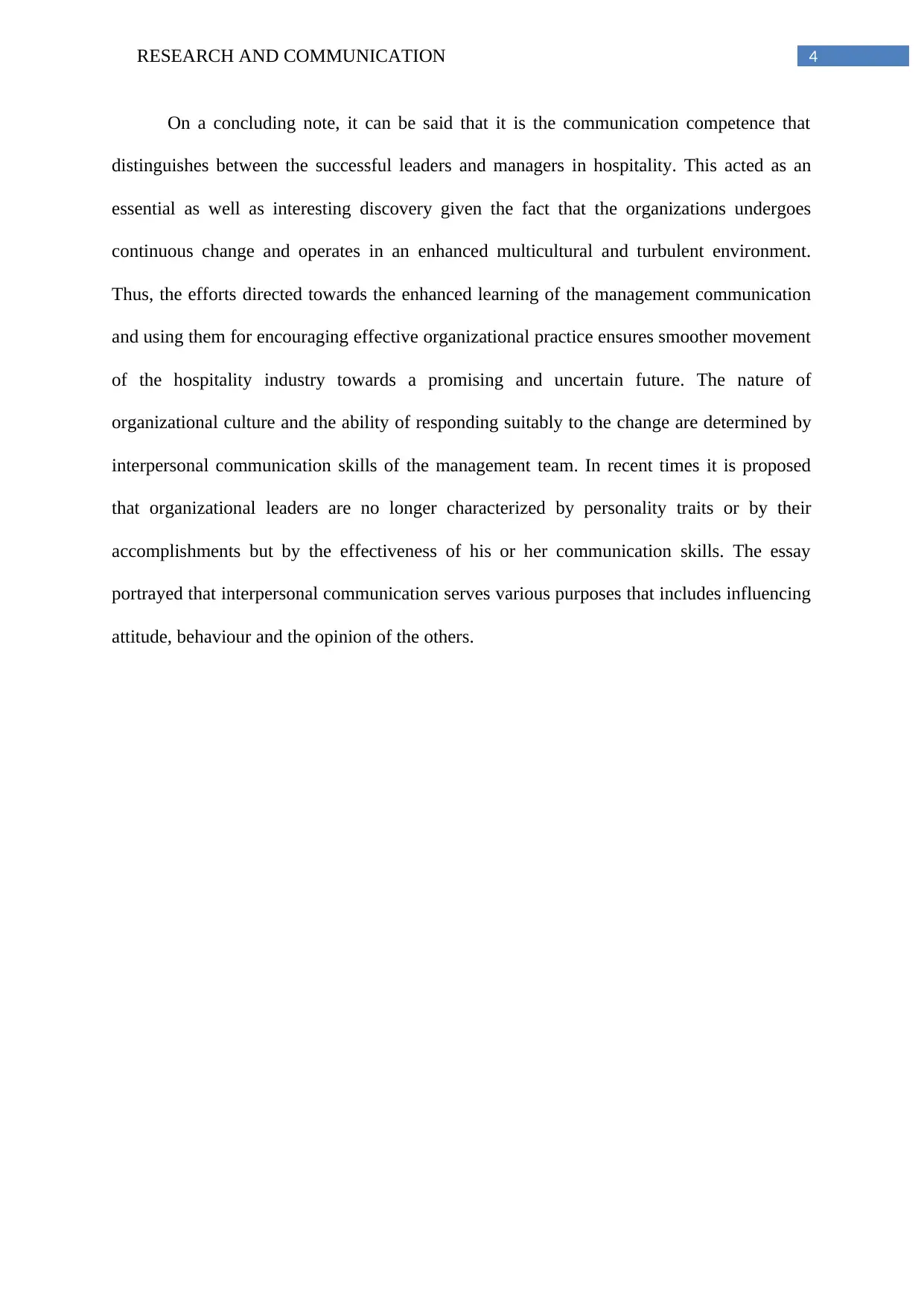
4RESEARCH AND COMMUNICATION
On a concluding note, it can be said that it is the communication competence that
distinguishes between the successful leaders and managers in hospitality. This acted as an
essential as well as interesting discovery given the fact that the organizations undergoes
continuous change and operates in an enhanced multicultural and turbulent environment.
Thus, the efforts directed towards the enhanced learning of the management communication
and using them for encouraging effective organizational practice ensures smoother movement
of the hospitality industry towards a promising and uncertain future. The nature of
organizational culture and the ability of responding suitably to the change are determined by
interpersonal communication skills of the management team. In recent times it is proposed
that organizational leaders are no longer characterized by personality traits or by their
accomplishments but by the effectiveness of his or her communication skills. The essay
portrayed that interpersonal communication serves various purposes that includes influencing
attitude, behaviour and the opinion of the others.
On a concluding note, it can be said that it is the communication competence that
distinguishes between the successful leaders and managers in hospitality. This acted as an
essential as well as interesting discovery given the fact that the organizations undergoes
continuous change and operates in an enhanced multicultural and turbulent environment.
Thus, the efforts directed towards the enhanced learning of the management communication
and using them for encouraging effective organizational practice ensures smoother movement
of the hospitality industry towards a promising and uncertain future. The nature of
organizational culture and the ability of responding suitably to the change are determined by
interpersonal communication skills of the management team. In recent times it is proposed
that organizational leaders are no longer characterized by personality traits or by their
accomplishments but by the effectiveness of his or her communication skills. The essay
portrayed that interpersonal communication serves various purposes that includes influencing
attitude, behaviour and the opinion of the others.
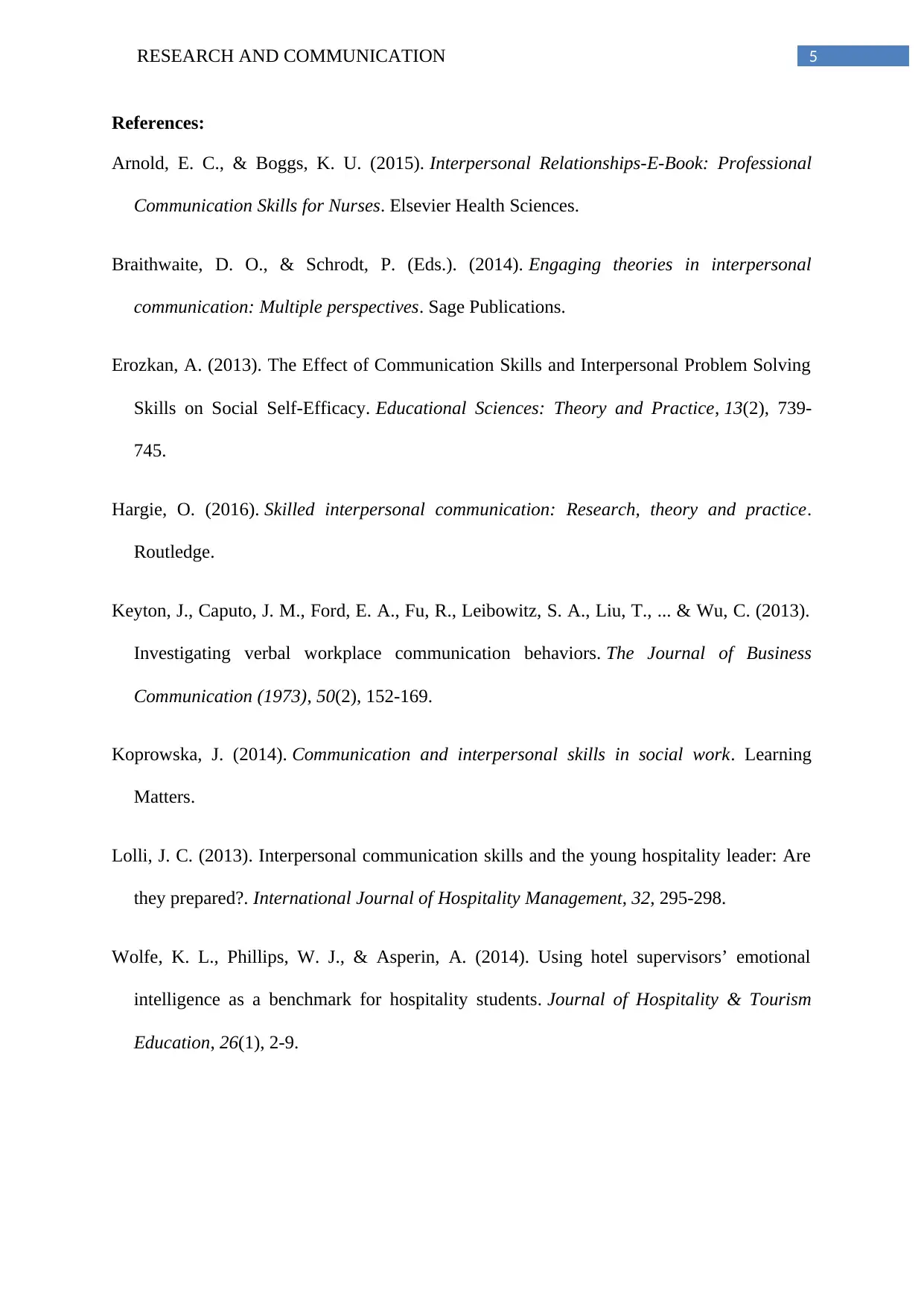
5RESEARCH AND COMMUNICATION
References:
Arnold, E. C., & Boggs, K. U. (2015). Interpersonal Relationships-E-Book: Professional
Communication Skills for Nurses. Elsevier Health Sciences.
Braithwaite, D. O., & Schrodt, P. (Eds.). (2014). Engaging theories in interpersonal
communication: Multiple perspectives. Sage Publications.
Erozkan, A. (2013). The Effect of Communication Skills and Interpersonal Problem Solving
Skills on Social Self-Efficacy. Educational Sciences: Theory and Practice, 13(2), 739-
745.
Hargie, O. (2016). Skilled interpersonal communication: Research, theory and practice.
Routledge.
Keyton, J., Caputo, J. M., Ford, E. A., Fu, R., Leibowitz, S. A., Liu, T., ... & Wu, C. (2013).
Investigating verbal workplace communication behaviors. The Journal of Business
Communication (1973), 50(2), 152-169.
Koprowska, J. (2014). Communication and interpersonal skills in social work. Learning
Matters.
Lolli, J. C. (2013). Interpersonal communication skills and the young hospitality leader: Are
they prepared?. International Journal of Hospitality Management, 32, 295-298.
Wolfe, K. L., Phillips, W. J., & Asperin, A. (2014). Using hotel supervisors’ emotional
intelligence as a benchmark for hospitality students. Journal of Hospitality & Tourism
Education, 26(1), 2-9.
References:
Arnold, E. C., & Boggs, K. U. (2015). Interpersonal Relationships-E-Book: Professional
Communication Skills for Nurses. Elsevier Health Sciences.
Braithwaite, D. O., & Schrodt, P. (Eds.). (2014). Engaging theories in interpersonal
communication: Multiple perspectives. Sage Publications.
Erozkan, A. (2013). The Effect of Communication Skills and Interpersonal Problem Solving
Skills on Social Self-Efficacy. Educational Sciences: Theory and Practice, 13(2), 739-
745.
Hargie, O. (2016). Skilled interpersonal communication: Research, theory and practice.
Routledge.
Keyton, J., Caputo, J. M., Ford, E. A., Fu, R., Leibowitz, S. A., Liu, T., ... & Wu, C. (2013).
Investigating verbal workplace communication behaviors. The Journal of Business
Communication (1973), 50(2), 152-169.
Koprowska, J. (2014). Communication and interpersonal skills in social work. Learning
Matters.
Lolli, J. C. (2013). Interpersonal communication skills and the young hospitality leader: Are
they prepared?. International Journal of Hospitality Management, 32, 295-298.
Wolfe, K. L., Phillips, W. J., & Asperin, A. (2014). Using hotel supervisors’ emotional
intelligence as a benchmark for hospitality students. Journal of Hospitality & Tourism
Education, 26(1), 2-9.
⊘ This is a preview!⊘
Do you want full access?
Subscribe today to unlock all pages.

Trusted by 1+ million students worldwide

6RESEARCH AND COMMUNICATION
1 out of 7
Related Documents
Your All-in-One AI-Powered Toolkit for Academic Success.
+13062052269
info@desklib.com
Available 24*7 on WhatsApp / Email
![[object Object]](/_next/static/media/star-bottom.7253800d.svg)
Unlock your academic potential
Copyright © 2020–2026 A2Z Services. All Rights Reserved. Developed and managed by ZUCOL.




